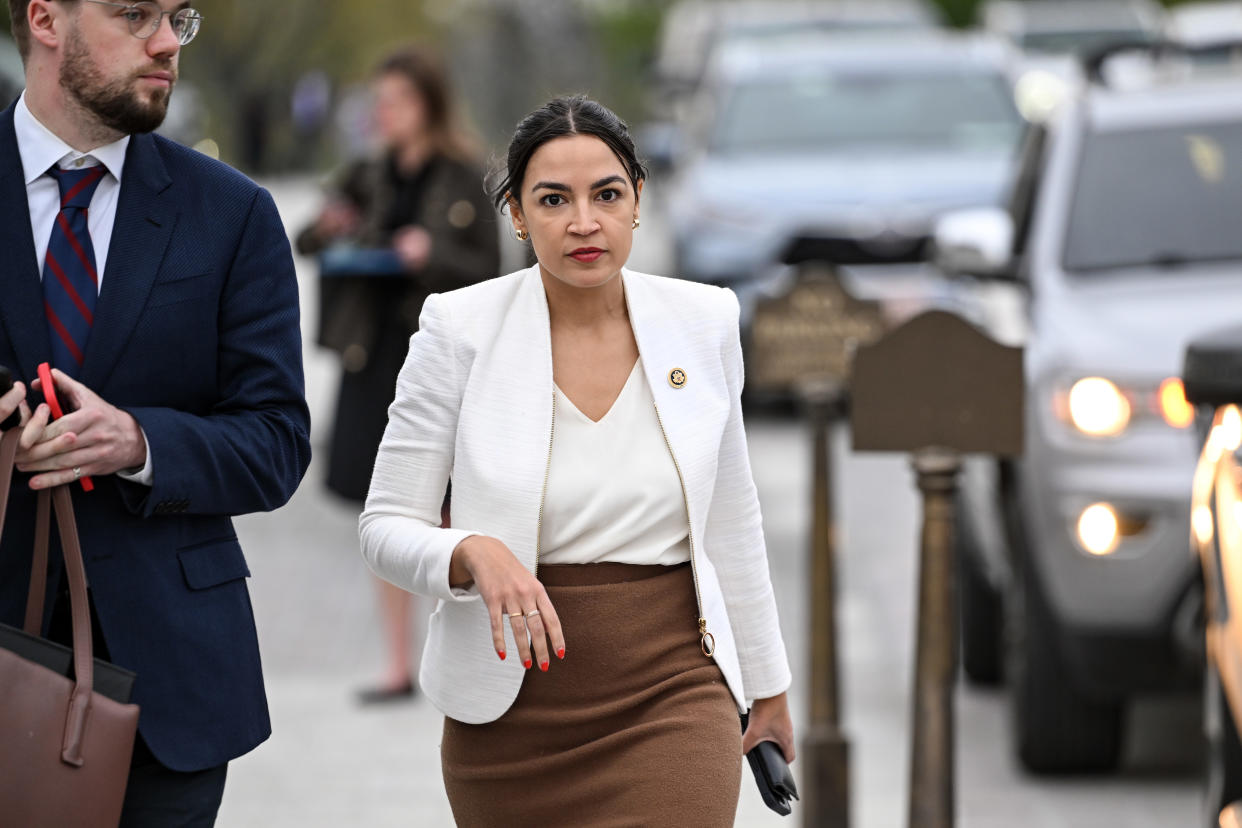Ocasio-Cortez Never Steered Money to a Key Arm of Her Party. Until Now.

- Oops!Something went wrong.Please try again later.
- Oops!Something went wrong.Please try again later.
- Oops!Something went wrong.Please try again later.
- Oops!Something went wrong.Please try again later.
- Oops!Something went wrong.Please try again later.
Rep. Alexandria Ocasio-Cortez has made her first-ever contribution to the campaign arm of House Democrats — a $260,000 donation that is a milestone in the New York Democrat’s long and complicated relationship with her own party’s political establishment.
In an interview, Ocasio-Cortez said her decision to give to the campaign arm, the Democratic Congressional Campaign Committee, was driven primarily by the dire threat of Republicans staying in power. She feared a Republican-controlled House would not certify a potential reelection of President Joe Biden this fall.
“The entire country saw a terrorist attack on the United States Capitol that was predicated on not certifying the duly submitted results of a presidential election,” Ocasio-Cortez said of the riot on Jan. 6, 2021. “And if anybody thinks that that was not a dress rehearsal for what they may try to attempt in January of 2025, I’m sorry to say, but I think that’s a very naive assumption.”
Sign up for The Morning newsletter from the New York Times
Ocasio-Cortez rocked the Democratic establishment in 2018 when she defeated one of the most powerful members of Congress in a stunning primary upset, ousting Joseph Crowley, who represented a diverse district in Queens and the Bronx and who was in line to be a potential House speaker. She arrived on Capitol Hill as the youngest woman ever elected to the House and as an instant insurgent instigator who protested that fall in the office of the incoming House speaker, Nancy Pelosi, before even being sworn in.
But Ocasio-Cortez quickly began to work within the political system, building alliances and pressing for policies that have been included in legislation. Her transfer of funds was another step in the 34-year-old lawmaker’s evolution inside the Democratic Party.
Ocasio-Cortez said the cash transfer represented her assessment that House Democratic leadership had changed sufficiently to now merit her money.
“If we take a look at it, we have the entirety of House leadership has now changed,” she said, citing the exit of Reps. Nancy Pelosi, Steny Hoyer and James Clyburn from the top of the House Democratic hierarchy.
“We’ve exerted a lot of our power through our existing channels,” she added. “Now it’s time to assert our influence in larger institutions, including the DCCC.”
Almost immediately after her election, Ocasio-Cortez became the face of a small cohort of progressives known as “the Squad” that tried to pull the party to the left politically and on policy. She was a rising star on the left and vilified relentlessly on the right. Early reports that she was considering backing a primary challenge to another prominent New York Democrat, Rep. Hakeem Jeffries, who is now the party’s leader, created added friction within her party even if such a challenge never emerged.
In 2019, the Democratic Congressional Campaign Committee established a blacklist of consultants and vendors who worked for Ocasio-Cortez and other candidates who challenged incumbents. She and others loudly objected, and by 2021, the blacklist was dissolved.
“We spent a lot of time, since first coming into office in 2019, working to change this institution,” she said of the campaign committee. “And we have successfully done so.”
In a statement, Jeffries thanked Ocasio-Cortez for “helping us protect the integrity of the electoral process and take back the House in 2024,” calling her “a valuable member of the House Democratic Caucus who is a powerful voice for the voiceless and defender of democracy.”
Ocasio-Cortez has become one of the Democratic Party’s most prolific fundraisers; her campaign committee has raised more than $37 million since 2019. She has raised another $11.1 million, according to her office, for nonfederal candidates and causes, including nonprofits, food banks and abortion-rights groups.
But until now, she had never given a dime to her own party’s leadership, even though House Democrats are each assigned “dues” that they are supposed to pay to remain members in good standing.
Ocasio-Cortez’s $260,000 contribution is earmarked specifically for the party’s Voter Protection Program. It is the first time a member of Congress has given money to a program that works on voter registration, poll observation and litigation.
Her political action committee has another $500,000 that she said was intended to defend fellow members of the Squad from party challengers, a sum that she noted was larger than her transfer to the campaign arm.
Ocasio-Cortez and the party are aware that her financial support could be used against candidates running in swing districts. But she said that with the earmarked funds, “we just tried to make that argument as ineffective for Republicans as possible.”
The “foundational element” of her decision to give now, Ocasio-Cortez said, was to make sure she helped Democrats take back the House, which Republicans narrowly control now.
She said she had little confidence that Speaker Mike Johnson, who is set to appear at Mar-a-Lago on Friday with former President Donald Trump to make an “election integrity” announcement, would rebuff any efforts by Trump to overturn the election.
“This party has turned into a party of Trumpism and it has turned into a cult of personality,” she said. “I don’t know if Mike Johnson has it in him to defend our democracy against a threat like that.”
c.2024 The New York Times Company

